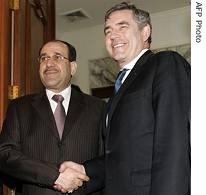2007年VOA标准英语-British Military Commanders Recommend Prompt Wi(在线收听)
London
19 August 2007
London's Independent on Sunday newspaper says two senior British generals have told Prime Minister Gordon Brown that Britain has accomplished what it can in southern Iraq and that moves toward a full withdrawal should be made without further delay. For the VOA, Tom Rivers has details from London.
Prior to the invasion in 2003, the British Army's stated war aims were to bring stability and democracy to Iraq and to the Middle East as a whole. But the Independent on Sunday newspaper says the main priority now is an orderly withdrawal that will leave the army's reputation reasonably intact and allow Britain to retain its status as a "credible ally" of the United States.

Iraq's PM Nuri al-Maliki, left, with Britain's Gordon Brown in Baghdad
(File Photo - 11 June 2007)
Those changes appear to represent a drastic downsizing of Britain's goals.
The two generals, who the newspaper did not name, said they would like to see Basra Palace handed over to Iraqi control by the end of August.
Some 500 British soldiers are stationed at the palace which is reportedly subjected to daily rocket and mortar strikes.
If that withdrawal can be accomplished in the next few weeks, that would leave around 5,000 British troops at Basra airport.
In July, after meeting with U.S. President George Bush, Prime Minister Gordon Brown said British troops will stay in Iraq until their mission is complete. The prime minister is expected to outline to parliament his overall Iraq withdrawal plans in October. Many expect to see remaining British forces pulled out in the months following that announcement.
One hundred sixty eight British service personnel have died in Iraq since the 2003 invasion and the war is unpopular in Britain.
Another factor affecting government thinking is the feeling that the British military is overstretched. Most military analysts say Britain can handle extended deployments in either Iraq or Afghanistan, but not both.
The head of the British Army, General Richard Dannatt, on a tour of soldiers in southern Afghanistan, told the BBC that troop strength in Afghanistan has reached its limit.
"The army is certainly stretched and when I say that we cannot deploy anymore battle groups at the present moment, that is because we are trying to get a reasonable balance of life for our people between time deployed, time on training and time in barracks," he said. "Currently, the time in barracks is not as much as I would like."
Since 2001, 70 British soldiers have been killed in Afghanistan. General Dannatt expects British forces to be in Afghanistan for years to come.